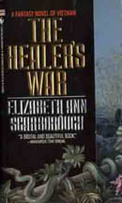
| Publisher: | Bantam |
| Copyright: | November 1988 |
| Printing: | October 1989 |
| ISBN: | 0-553-28252-2 |
| Format: | Mass market |
| Pages: | 312 |
Lt. Kitty McCulley is an Army nurse in Vietnam. She didn't intend to volunteer for that war, and in fact opposed war in general, but she was tired of not having any money to finish her schooling, Vietnam didn't look as bad as previous wars, and she was told she'd have to volunteer for combat duty to end up in Vietnam. This, of course, turned out to be a lie.
Once in the country, she was assigned to an Army hospital out of the way of most of the fighting, a hospital whose primary purpose was to heal GI casualties, but which secondarily tried to help some of the allied native Vietnamese. The start of the book is vivid scene-setting, showing a portrait of life away from the insanity of combat but still in the middle of the insanity of war. Kitty's life isn't pleasant, but it's livable. She's able to help people, including an old man whose mysterious amulet gives her visions while she's keeping it for him during surgery. But when the situation takes a rapid turn for the worst, she ends up lost in the jungle with only that magical amulet to help her try to navigate the fear, chaos, and insanity of open combat and destroyed villages.
This is primarily a Vietnam war story. The slight touch of fantasy is there to allow the viewpoint character to see a bit more about other characters, to understand the emotions behind actions late in the book, and to let Kitty believably survive in the jungle. Towards the end of the book, the amulet also adds thematic resonance, contrasting cooperation and compassion with the emotions of the war. But the primary focus of the book is a tour of the attitudes, emotional reactions, and emotional damage of the war.
Like any good Vietnam novel, The Healer's War shows the horror of war and the way the focus of those in the middle of it becomes narrower, more limited, more tinted by the requirements of survival. What I found the most striking here was the way Scarborough highlighted the centrality of racism to the military attitude during the Vietnam war, and more generally how racism develops out of a war. She doesn't do this through preaching; to the contrary, The Healer's War does an fine job of showing Kitty's reactions and situation and letting the reader draw their own conclusions. She instead does this by showing the racism of the soldiers and administrators, showing how it develops out of the situations they're put in, and showing through Kitty the shock and displacement of being stationed in a foreign country with a nearly incomprehensible culture. The book highlights the nastiness of guerrilla war and a fearful and desperate local populace in ways that are sadly too applicable to the US's current war in Iraq.
This novel shows the reader people. Flawed, ambiguous, nasty, desperate, stunned, exhausted, or carefree, it shows people at their best and worst. There are few utter villains, and no pure heroes. There are people in extremes, in dangerous situations, in unnatural and horrific situations, who develop their own coping mechanisms. Some of those coping mechanisms are good, some are indifferent, some are disasterous. Scarborough does an excellent job portraying the weight and apparent inevitability of a war one is in the middle of, the way in which war becomes daily life and one cannot quite imagine it changing. Kitty's strong first-person viewpoint makes the emotions vivid. The story is a confessional, a diary, a journal. It rambles, it foreshadows, and at times it's despairing, but it was always compelling, even through the ugliness of war and a realistically difficult ending. It is, in short, an exceptionally good war novel, not just about Vietnam but also about what any war does to the people in the middle of it. It's impossible to read this novel today and not think of Iraq and wonder how much of the same effects are playing out there.
Scarborough was an Army nurse in Vietnam herself. It shows throughout the book. There is a vividness to the descriptions and a realism to the emotions that grabbed me, an immediacy that shows a deep understanding of what the war was like at more than a research level. I'm not much of a war novel fan normally and had put off reading a book that, despite winning a Nebula, features a fantasy element mostly as a plot device to show the war more clearly. Having read it, though, I can wholeheartedly recommend it to those who normally find war novels boring. This isn't about tactics, endless jungle missions, dramatic successes, or wartime heroics. It's about real people in man-created hells and how they try to survive. It's sobering, powerful, and an exceptional anti-war argument without a hint of dogmatism.
Reviewed: 2007-01-11